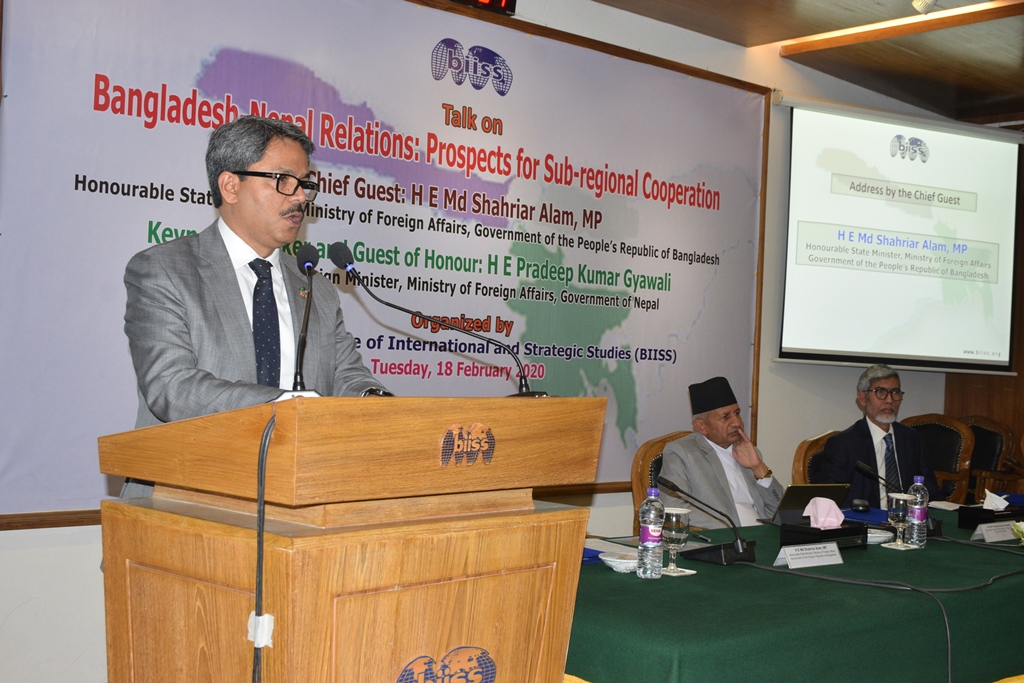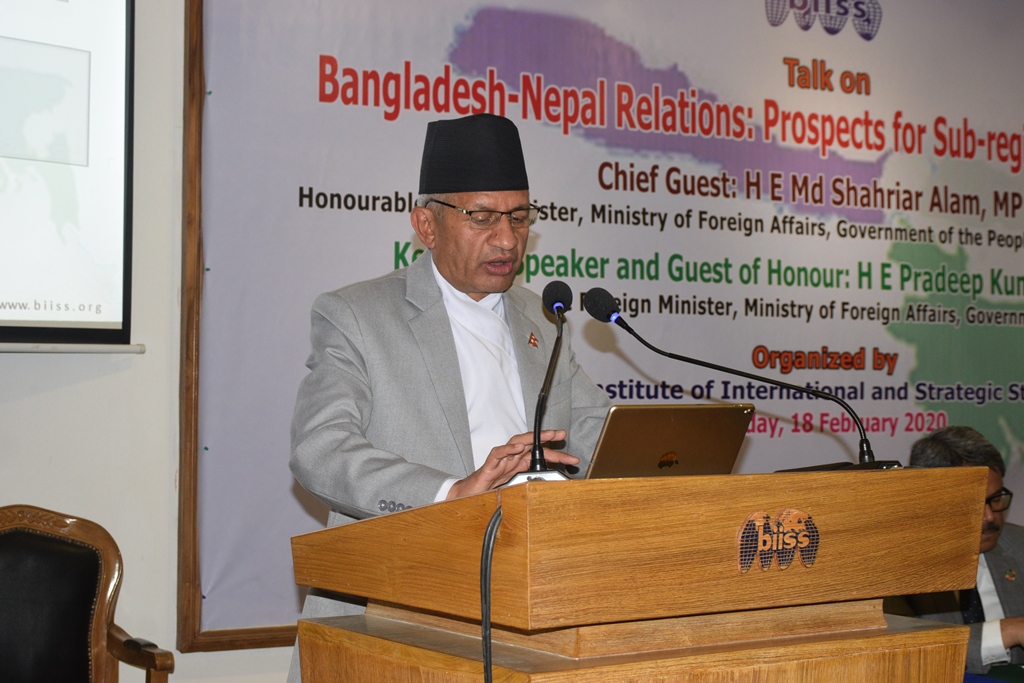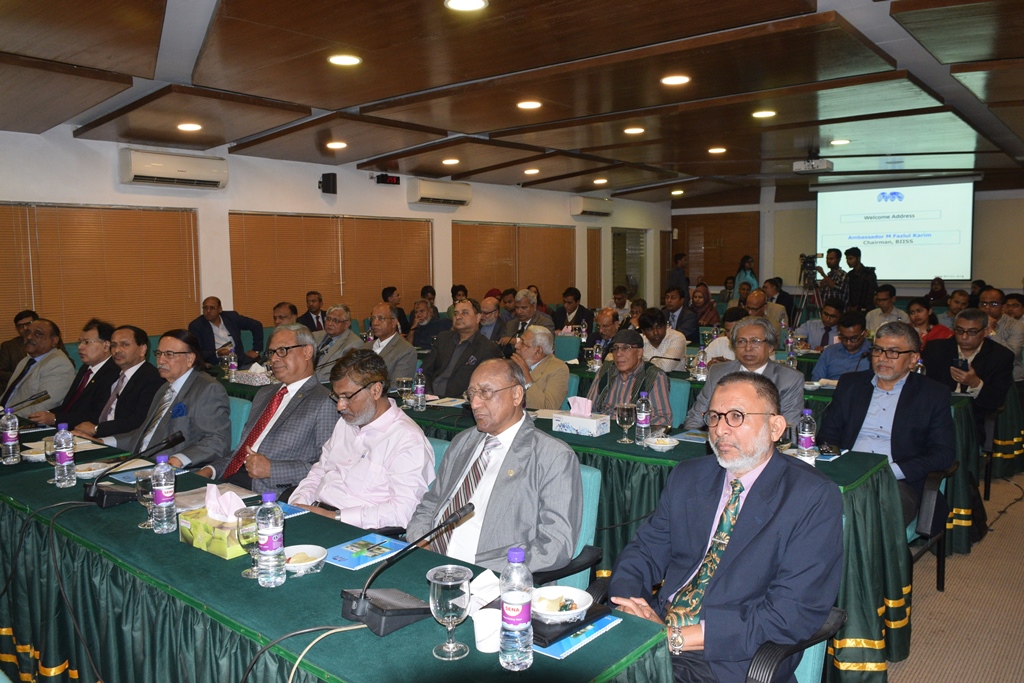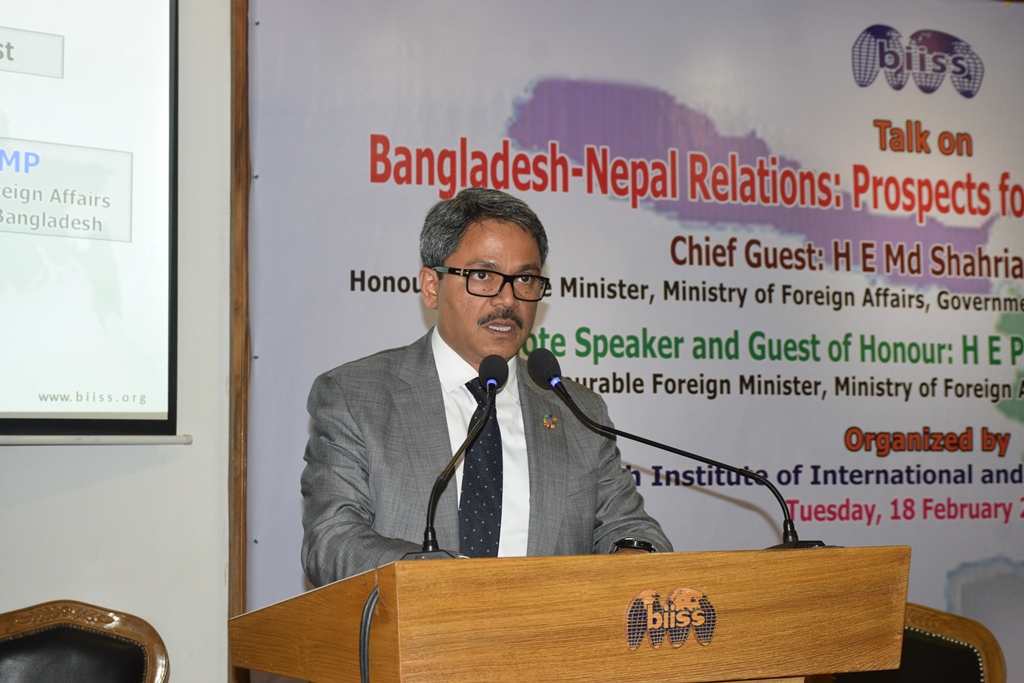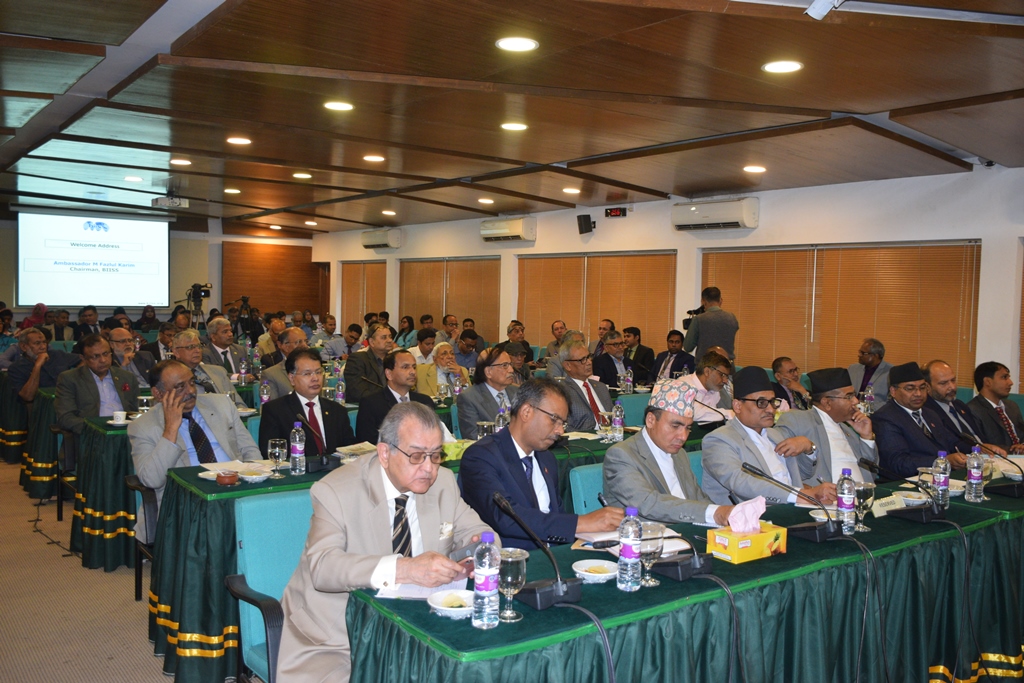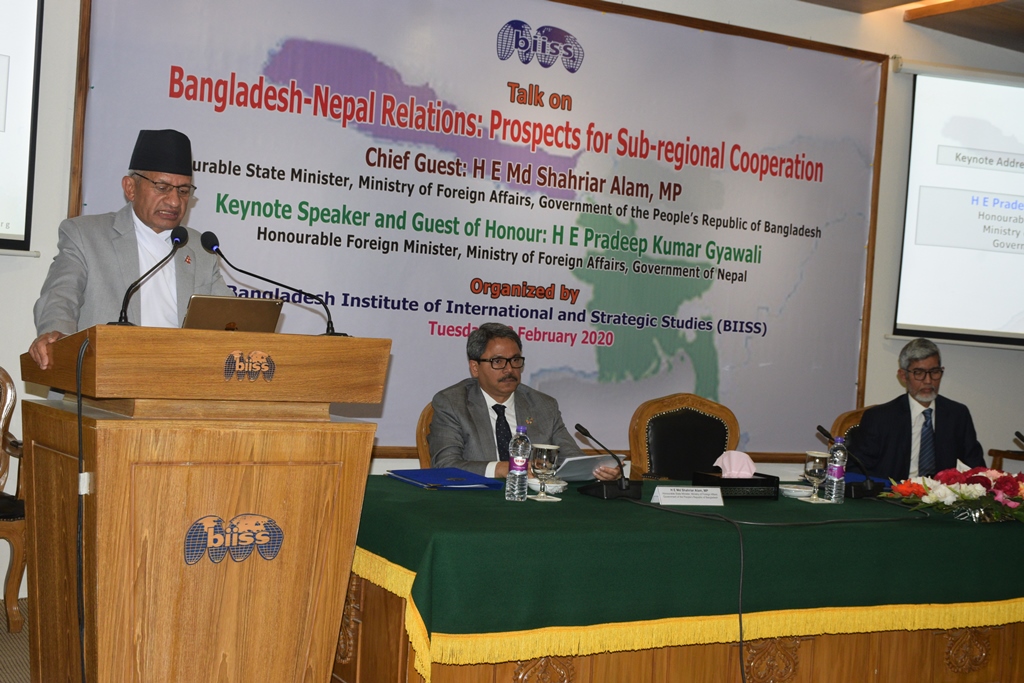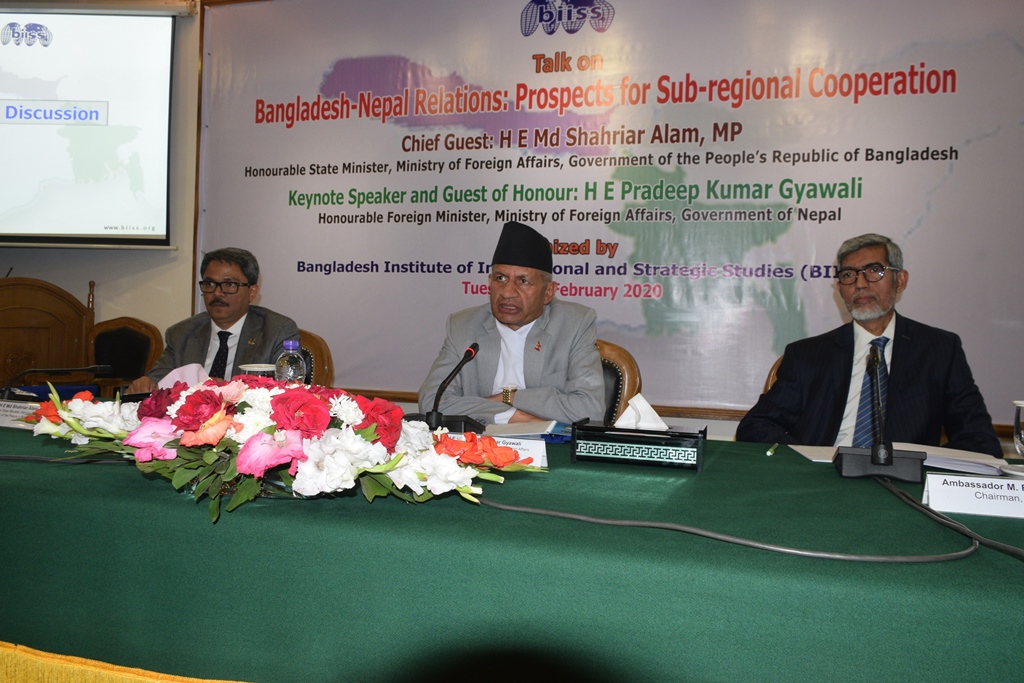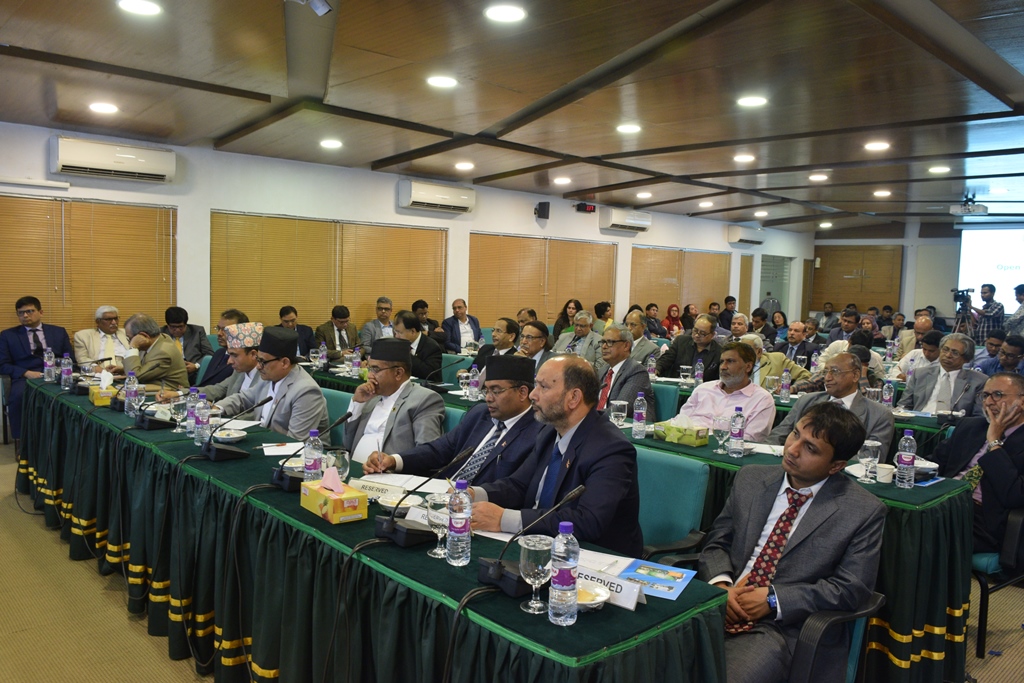Bangladesh-Nepal Relations: Prospects for Sub-regional Cooperation on 18 February 2020
DATE: 2020-02-18
Bangladesh Institute of International and Strategic Studies (BIISS) organized a talk on “Bangladesh-Nepal Relations: Prospect for Sub-Regional Cooperation” on 18 February 2020 at BIISS auditorium. H E Md Shahriar Alam, MP, Honourable State Minister, Ministry of Foreign Affairs, Government of the People’s Republic of Bangladesh graced the talk as the Chief Guest while H E Mr Pradeep Kumar Gyawali, Honorouable Minister, Ministry of Foreign Affairs, Government of Nepal was present as the keynote speaker as well as the Guest of Honour. Ambassador M Fazlul Karim, Chairman, BIISS chaired the talk. He also delivered the welcome address.
Ambassador M Fazlul Karim said that Bangladesh and Nepal have enjoyed excellent relations ever since the establishment of diplomatic ties. The two countries share similar views on important international issues and work closely in various regional and international forums. The countries also have similar development visions with a view to attaining socio-economic progress and prosperity for the peoples. As Bangladesh aspires to achieve the goals of the vision 2021 and vision 2041, the Himalayan country has her own vision of a “Samriddha Nepal, Sukhi Nepali” (‘Prosperous Nepal, Happy Nepali’).
He highlighted two of the most prospectus areas of sub-regional cooperation between Bangladesh and Nepal. First is the tourism industry. Both Bangladesh and Nepal have huge potential in the travel, tourism and hospitality sector. In the past years, there have been exchanges of large numbers of tourists between the two countries. Bangladesh is eagerly waiting to welcome more tourists from Nepal in coming years. People-to-people connectivity is another promising area of sub-regional cooperation between Bangladesh and Nepal. Bangladesh is a destination for several aspiring students from many countries of South Asia as the country provides high yet affordable standards of education. Hundreds of Nepalese students come to Bangladesh every year to study medicine, nursing, dentistry, engineering, agriculture and other courses. There should be frequent exchanges of cultural troops and more sports related groups. He concluded with a hope that focusing on these two sectors along with energy, connectivity and trade will take the bilateral relation of Bangladesh and Nepal to great heights.
H E Mr Pradeep Kumar Gyawali stated that Nepal and Bangladesh are two close friends than neighbours. Geographically, both countries are only a few miles away. This geographical proximity together with similarity in cultures, traditions and values explains their deep-rooted friendship, growing people to people contact and cementing ties. The two lands have been natured by wisdom and insights of the great saints and philosophers like Lord Buddha and Rabindranath Tagore. These are also bringing two countries spiritually, culturally and emotionally closer. Moreover, the rivers flowing down from the Himalayas of Nepal cultivated the fertile lands of Bangladesh and have enormously contributed to the development of civilization. Hence, both countries should take pride in this natural and civilizational heritage. Referring to economic cooperation, he said that though the volume of bilateral trade is still at an immoderate level, there is immense scope for its expansion. Thus, there is a need for concrete measures so that both countries can enjoy mutually beneficial trade relationships. This can be drawn by fostering complementaries, eliminating both tariff and non-tariff trade barriers, adopting facilitating measures, developing required infrastructures, expanding connectivity and promoting productive sectors.
Mr Gyawali noted that energy is one of the most important areas of cooperation between Nepal and Bangladesh. They have already agreed to work together on the development of the energy sector and its trade. He insisted that Nepal’s hydropower and Bangladesh’s gas are offering a promising future for development. If developed properly, the development landscape of both countries will be vastly transformed. Two countries have recently signed a Memorandum of Understanding (MoU) to promote power trade. This will lead to fruitful cooperation between the two countries. In this process, they also need to develop trilateral cooperation involving Nepal, India and Bangladesh. He emphasized that Nepal and Bangladesh relations have not only confined to the bilateral domain only. Both countries support each other in various global forums on different issues of common interest ranging from climate change to international support for the developing countries. Both countries are among the largest contributors to the United Nations peacekeeping operations. He hoped that for the mutual benefit this spirit will be continued in the days ahead.
On the issue of sub-regional cooperation, he mentioned that South Asian countries are on the same phrase. Furthermore, the countries have immense potential to benefit from deeper engagement and interdependence. Abundant natural resources, dynamic and educated human resources, geographical, cultural and civilizational linkages and growing people-to-people relations have created a sound basis for meaningful sub-regional cooperation. However, full realization of these potentials is also needed. Individually, countries of South Asia have been engaging with each other on their own. A sub-regional platform can be more fruitful for generating benefit if interconnectedness developed, interdependence fostered in all aspects with the objectives of ensuring equitable sharing of benefits to all constituting members. In turn, this will further ensure regional peace and stability.
H E Md Shahriar Alam, MP said that as a nation Bangladesh and its 160 million people are ever so grateful to Nepal especially for the contribution made by the then leadership towards Bangladesh’s struggle and war of independence. Prime Minister Sheikh Hasina, the daughter of the Father of the Nation Bangabandhu Sheikh Mujibur Rahman, often reminds about those contributions. Even after the independence of Bangladesh when the country was struggling to feed the then 75 million people, Nepal went on to export 15 thousand tons of rice from its own limited resources. In the new era, things have progressed and in some other area things are yet to progress. The countries are yet to accomplish and fulfill the dreams of our nations. He suggested few major areas that can be further taken. He referred that Prime Minister Sheikh Hasina quite frequently uses the expression that she wants to build a facility using the corridor of India and between the two countries Nepal and Bangladesh in a way that tourists will be hiking in Nepal and next day or in the afternoon they can come and enjoy the sandy sea beaches of Cox’s bazar. This showed the level of seriousness, objective, plan and policy that the government in Bangladesh is trying to adopt regarding tourism. Regarding road connectivity, he mentioned that there were discussions and talks taking place. The next issue was about energy. He informed that it is probably the first of its kind in the sub-continent that Bangladesh, Nepal and India came together to set up a first ever hydro power plant in Nepal. He was positive that through this initiative all the three countries will be benefitted by sharing the power. Towards the end, he expressed his gratitude to Honourable Foreign Minister of Nepal, his team and colleague and everyone else to make this long awaited visit a successful one.
Officials from different ministries of Bangladesh government, representatives of different embassies, representatives of different international and national organizations, former ambassadors, researchers of different institutes, high officials of different civil and military institutions, media and academia participated in the open discussion and raised their valuable opinions, observations and questions to the seminar. They expected a strongly bonded relationship between Bangladesh and Nepal in the areas of energy, water management and connectivity.

